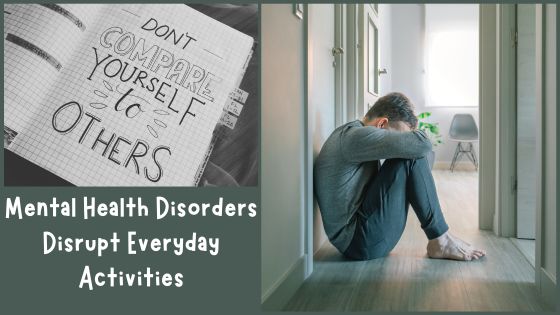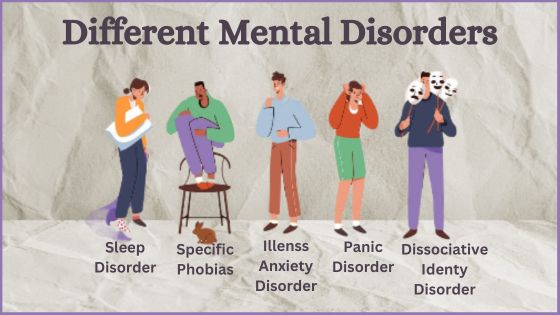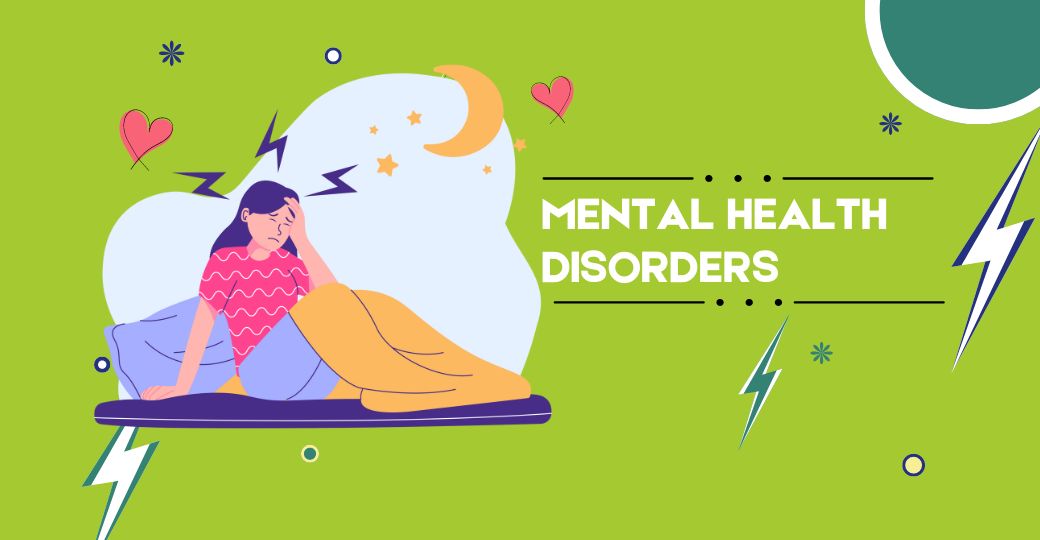Mental health disorders disrupt everyday activities, affecting a person’s ability to function normally in their daily lives. With conditions such as anxiety, depression, and bipolar disorder, individuals may struggle with tasks like work, relationships, and self-care, leading to significant challenges and impairments.
These disorders can cause emotional distress, difficulty concentrating, and a lack of motivation, making it difficult to complete even the most basic activities. Seeking proper diagnosis and treatment from mental health professionals is crucial for managing these disorders and restoring a higher quality of life.
With the right support and interventions, individuals can regain control over their daily activities and find relief from the disruptions caused by mental health disorders.
The Impact Of Mental Health Disorders On Daily Life
The Underestimated Weight Of Mental Health Disorders
Mental health disorders disrupt everyday activities are often underestimated in terms of their impact on daily life. While they may not be as visible as physical ailments, the weight they carry cannot be ignored. These conditions can disrupt everyday activities, making it challenging for individuals to go about their daily routines smoothly.
Let’s delve into the different ways in which mental mental health disorders disrupt everyday activities.
How Mental Health Disorders Affect Daily Routines
When mental health disorders arise, they can significantly impact a person’s ability to perform everyday activities. Here are some ways in which these mental health disorders disrupt everyday activities:
- Struggling with concentration: One of the primary challenges faced by individuals with mental health disorders is difficulty in staying focused and concentrated. This can make it challenging to complete tasks efficiently and effectively.
- Disrupted sleep patterns: Mental health disorders often disrupt sleep patterns, leading to insomnia or restless nights. Lack of sleep can further exacerbate symptoms and make it difficult to function optimally throughout the day.
- Loss of motivation: Individuals with mental health disorders often experience a significant loss of motivation to engage in activities they once enjoyed. This lack of enthusiasm can affect their willingness to participate in regular daily routines.
- Social withdrawal: Mental health disorders can lead to feelings of isolation and loneliness, causing individuals to withdraw from social interactions. This can make it challenging to maintain relationships and engage in social activities.
- Impact on productivity: The impact of mental health disorders on daily life can be seen in reduced productivity levels. Individuals may struggle to complete tasks within deadlines or find it challenging to start and finish projects.
- Disruptions in self-care: Mental health disorders can also affect an individual’s ability to take care of themselves physically. Basic tasks such as personal hygiene, eating balanced meals, and exercising regularly may be neglected.
Overcoming Obstacles Posed By Mental Health Disorders
While mental health disorders pose significant challenges, it is possible to overcome the obstacles they present. Here are some strategies to help individuals cope:
- Seeking professional help: Consulting a mental health professional is essential to understand and manage mental health disorders effectively. They can provide guidance, therapy, and medication if necessary.
- Developing a support system: Building a strong support system consisting of friends, family, and support groups can provide emotional support and understanding.
- Creating a routine: Establishing a structured daily routine can help individuals manage their time, prioritize tasks, and maintain consistency.
- Engaging in self-care practices: Focusing on self-care is crucial for overall well-being. This includes activities like exercising regularly, getting enough sleep, and practicing relaxation techniques.
- Taking breaks and setting boundaries: It’s important for individuals to recognize their limits and take breaks when needed. Setting boundaries in personal and professional life can help manage stress and prevent burnout.
Remember, mental health disorders can have a profound impact on daily life, but with the right support and strategies in place, individuals can regain control and lead fulfilling lives.

Common Mental Health Disorders: Symptoms And Coping Strategies
Anxiety: Managing Worry And Panic Attacks
Anxiety disorders can be incredibly overwhelming, impacting daily activities and overall well-being. It’s crucial to understand the symptoms and develop effective coping strategies to manage anxiety effectively. Here are some key points to consider:
Identifying symptoms of anxiety disorders:
- Excessive worrying about different aspects of life, such as work, family, or health.
- Restlessness and feeling on edge throughout the day.
- Difficulty concentrating or experiencing mind going blank.
- Physical symptoms such as rapid heartbeat, sweating, trembling, or shortness of breath.
Practical coping strategies for anxiety:
- Practice deep breathing exercises to help calm the mind and body during anxiety episodes.
- Engage in regular physical exercise to reduce tension and release endorphins.
- Challenge negative thoughts and replace them with more positive and realistic ones.
- Seek professional help if anxiety symptoms persist or interfere significantly with daily life.
Depression: Navigating The Depths Of Sadness
Depression is a debilitating mental health disorder that can disrupt everyday activities, making it essential to recognize its signs and learn effective coping mechanisms. Consider the following points:
Recognizing signs of depression:
- Feeling persistently sad, empty, or hopeless for an extended period.
- Decreased interest or pleasure in activities previously enjoyed.
- Significant changes in appetite, weight, or sleep patterns.
- Fatigue or loss of energy, leading to decreased productivity.
Effective coping mechanisms for depression:
- Build a support network of trusted friends and family members to confide in and seek help.
- Engage in self-care activities such as practicing mindfulness, getting enough rest, and maintaining a healthy lifestyle.
- Consider therapy or counseling to develop coping strategies and address underlying causes of depression.
- Explore medications prescribed by a healthcare professional to help manage symptoms.
OCD: Tackling Intrusive Thoughts And Rituals
Obsessive-compulsive disorder (ocd) is characterized by intrusive thoughts and repetitive behaviors. To cope with ocd effectively, it’s crucial to understand its symptoms and implement specific strategies. Here’s what you should know:
Understanding obsessive-compulsive disorder symptoms:
- Persistent, unwanted, and distressing thoughts or urges (obsessions).
- Engaging in repetitive behaviors or rituals to alleviate anxiety or prevent feared outcomes (compulsions).
- Feeling unable to control or stop these obsessions and compulsions.
- Experiencing significant distress or impairment due to ocd symptoms.
Implementing strategies to cope with ocd:
- Practice exposure and response prevention therapy to gradually face and resist ocd-related thoughts or behaviors.
- Engage in activities that distract from obsessive thoughts, such as exercise, hobbies, or socializing.
- Seek support from a mental health professional specializing in ocd treatment.
- Consider medication options prescribed by a doctor to manage symptoms if necessary.
PTSD: Healing From Past Trauma
Post-traumatic stress disorder (ptsd) can arise after experiencing or witnessing a traumatic event. Recognizing its symptoms and developing coping strategies is essential for healing and moving forward. Consider the following points:
Recognizing symptoms of post-traumatic stress disorder:
- Intrusive memories, flashbacks, or nightmares related to the traumatic event.
- Avoiding reminders of the trauma, including places, people, or activities.
- Experiencing intense emotions like fear, anger, or guilt.
- Hyperarousal, including difficulty sleeping, irritability, or being easily startled.
Developing strategies for overcoming ptsd:
- Practice grounding techniques like deep breathing or focusing on the present moment.
- Engage in trauma-focused therapy to process and heal from the traumatic event.
- Utilize support systems, such as family, friends, or support groups, to share experiences and receive understanding.
- Consider medication options prescribed by a mental health professional to alleviate symptoms if necessary.
Remember that seeking professional help is crucial when dealing with mental health disorders. By understanding the symptoms and implementing coping strategies, individuals can take steps towards managing their conditions and living a fulfilling life.

Seeking Help And Support For Mental Health Disorders Disrupt Everyday Activities
The Importance Of Seeking Professional Help
Seeking professional help is crucial when dealing with mental health disorders. Here are some key points to consider:
- Professional help provides expert guidance and support in managing mental health disorders effectively.
- Mental health professionals have the knowledge and experience to accurately diagnose and treat mental health conditions.
- Seeking professional help can lead to improved overall well-being and quality of life.
- Therapists and counselors offer a safe space for individuals to express their emotions and concerns.
- Professional help can help individuals develop coping strategies and learn effective techniques to manage their symptoms.
Overcoming The Stigma Surrounding Mental Health Disorders
Overcoming the stigma associated with mental health disorders is essential for seeking help and support. Consider the following points:
- Stigma creates barriers that prevent individuals from seeking help and talking openly about their mental health.
- Education and awareness play a significant role in challenging stereotypes and reducing stigma.
- Sharing personal experiences and stories can help break down the barriers of stigma and encourage others to seek help.
- Support from friends, family, and mental health professionals can provide strength and reassurance in overcoming stigma.
Finding The Right Therapist Or Counselor
Finding the right therapist or counselor is key to receiving effective support. Consider the following tips:
- Start by researching and making a list of potential therapists or counselors who specialize in your specific mental health condition.
- Seek recommendations from trusted sources, such as healthcare professionals or support groups.
- Consider factors such as location, affordability, and therapeutic approach when choosing a therapist or counselor.
- Schedule initial consultations to assess their compatibility and ensure they create a safe and supportive environment for you.
Building A Support Network
Building a strong support network is essential for managing mental health disorders. Consider the following ideas:
- Reach out to friends and family who are understanding and supportive.
- Share your experiences and emotions with trusted individuals who will listen without judgment.
- Engage in activities that foster connections and relationships, such as joining clubs or organizations.
- Seek support from like-minded individuals who have similar experiences through support groups or online communities.
Engaging With Friends And Family For Support
Friends and family can offer invaluable support when dealing with mental health disorders. Consider these points:
- Let your loved ones know about your challenges and communicate your needs openly.
- Encourage open conversations about mental health to educate and raise awareness within your social circle.
- Involve friends and family in your treatment plan, allowing them to provide support and understanding.
- Set boundaries and communicate your limits to ensure that your mental health remains a priority.
Connecting With Support Groups And Online Communities
Support groups and online communities provide a sense of belonging and understanding. Consider these tips:
- Search for local support groups or online communities that focus on your specific mental health condition.
- Engage actively within these groups, asking questions and sharing experiences.
- Seek emotional support, gather helpful resources, and learn from others’ coping strategies.
- Remember, these communities are not a substitute for professional help but can complement your overall support system.
Self-Care Practices For Mental Well-Being
Self-care is an essential aspect of managing mental health disorders. Consider incorporating these practices into your routine:
- Prioritize activities that bring you joy and promote relaxation, such as hobbies or creative outlets.
- Practice mindfulness and meditation to foster a sense of calm and present moment awareness.
- Engage in regular physical exercise to boost endorphin levels and improve overall well-being.
- Practice good sleep hygiene to ensure adequate rest and rejuvenation.
Incorporating Self-Care Into Daily Routines
Integrating self-care into your daily routines can have a significant impact on mental well-being. Consider these suggestions:
- Create a self-care schedule or checklist to ensure you prioritize your well-being consistently.
- Allocate specific time slots for self-care activities, such as daily walks or meditation sessions.
- Set boundaries to protect your self-care time and avoid overcommitting to responsibilities.
- Experiment with various self-care practices to find what works best for you and develop a routine around them.
Exploring Relaxation Techniques And Activities
Relaxation techniques and activities can help manage stress and promote mental well-being. Consider these options:
- Practice deep breathing exercises to induce relaxation and reduce anxiety.
- Try progressive muscle relaxation, focusing on releasing tension from different muscle groups.
- Engage in activities like yoga or tai chi, which combine physical movement with mindfulness.
- Explore hobbies and activities that promote relaxation, such as painting, gardening, or reading.
Remember, each person’s journey towards mental health is personal, and it’s essential to find what works best for you. Seeking professional help, building a support network, and practicing self-care are vital steps towards a healthier and more balanced life.
Frequently Asked Questions Of Mental Health Disorders Disrupt Everyday Activities
How Do Mental Health Disorders Disrupt Everyday Activities?
Mental health disorders can disrupt daily routines, making it difficult to concentrate, perform tasks, and interact with others. Simple tasks may seem overwhelming, leading to decreased productivity and engagement in social activities. Seeking professional help and implementing coping strategies can help manage the impact of these disorders on everyday activities.
What Are The Common Signs Of Mental Health Disorders?
Common signs of mental health disorders include persistent feelings of sadness, excessive worrying, changes in appetite or sleep patterns, loss of interest in activities, difficulty concentrating, and withdrawal from social interactions. It is important to recognize these signs and seek professional help for an accurate diagnosis and appropriate treatment.
How Can Mental Health Disorders Be Managed?
Managing mental health disorders involves a combination of therapy, medication, and self-care practices. Therapy can help individuals learn coping mechanisms and develop healthy ways to manage their symptoms. Medication may be prescribed to address chemical imbalances in the brain. Self-care practices such as exercise, relaxation techniques, and maintaining a support system are also important in managing these disorders.
Conclusion
In a society where mental health issues are increasingly prevalent, it is crucial to recognize the disruption they can cause in everyday activities. Whether it is anxiety, depression, or any other mental health disorder, the impact on individuals’ lives can be profound.
From difficulties in maintaining relationships and social interactions to impaired work performance and reduced productivity, the consequences are far-reaching. Seeking support from professionals, such as therapists or counselors, can be immensely beneficial in managing these disorders and mitigating their impact.
Additionally, adopting self-care practices like regular exercise, adequate sleep, and mindfulness techniques can promote overall well-being. Understanding and empathy from society are also essential in reducing the stigma surrounding mental health, allowing individuals to seek help without fear of judgment.
By prioritizing mental health and supporting those affected, we can create a more inclusive and compassionate world.

I am an SEO expert, Digital Marketing-specialized writer, and blogger based in the USA & UK. I have four years of experience in SEO, Digital Marketing, Social Media, and Technology. So, I work on solving these issues and give various tips on these issues

